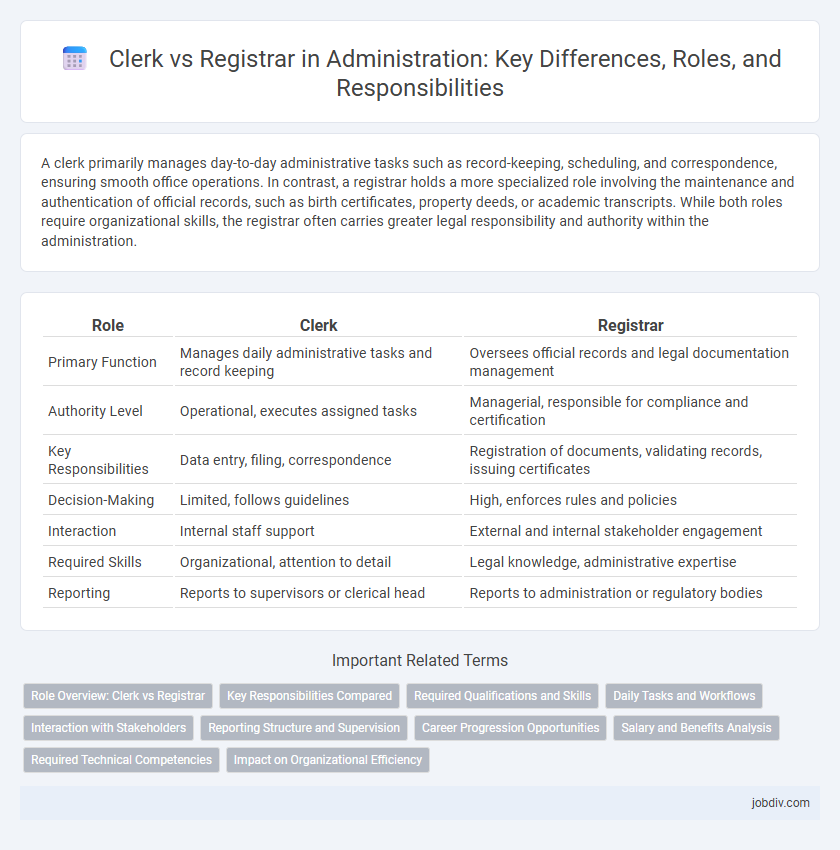A clerk primarily manages day-to-day administrative tasks such as record-keeping, scheduling, and correspondence, ensuring smooth office operations. In contrast, a registrar holds a more specialized role involving the maintenance and authentication of official records, such as birth certificates, property deeds, or academic transcripts. While both roles require organizational skills, the registrar often carries greater legal responsibility and authority within the administration.
Table of Comparison
| Role | Clerk | Registrar |
|---|---|---|
| Primary Function | Manages daily administrative tasks and record keeping | Oversees official records and legal documentation management |
| Authority Level | Operational, executes assigned tasks | Managerial, responsible for compliance and certification |
| Key Responsibilities | Data entry, filing, correspondence | Registration of documents, validating records, issuing certificates |
| Decision-Making | Limited, follows guidelines | High, enforces rules and policies |
| Interaction | Internal staff support | External and internal stakeholder engagement |
| Required Skills | Organizational, attention to detail | Legal knowledge, administrative expertise |
| Reporting | Reports to supervisors or clerical head | Reports to administration or regulatory bodies |
Role Overview: Clerk vs Registrar
The Clerk primarily manages clerical tasks such as record-keeping, data entry, and correspondence within an administrative office, ensuring accuracy and timely processing of documents. The Registrar oversees the official registration process, maintaining comprehensive databases of records like academic, legal, or civil status, and ensuring compliance with relevant regulations and policies. While the Clerk supports administrative operations, the Registrar holds authority over the validation and preservation of official records.
Key Responsibilities Compared
Clerks typically manage and organize documents, handle correspondence, and maintain records, ensuring smooth daily office operations. Registrars focus on maintaining accurate and secure records of official documents such as birth certificates, marriage licenses, and academic transcripts, often overseeing compliance with legal requirements. Both roles require attention to detail and organizational skills, but registrars have greater responsibility for the authentication and integrity of official records.
Required Qualifications and Skills
Clerks typically require a high school diploma or equivalent with strong organizational and communication skills, while registrars often need a bachelor's degree in public administration or a related field along with proficiency in database management and regulatory compliance. Clerks excel in record-keeping, customer service, and basic administrative tasks, whereas registrars possess advanced skills in data integrity, legal documentation, and institutional governance. Both roles demand attention to detail, but registrars usually handle more complex responsibilities requiring specialized knowledge and formal education.
Daily Tasks and Workflows
Clerks primarily handle routine administrative duties such as data entry, filing, and processing correspondence, ensuring smooth daily office operations. Registrars oversee official records management, including maintaining and verifying critical documents like birth certificates, marriage licenses, and academic transcripts. Workflows for clerks emphasize task completion and data accuracy, while registrars focus on legal compliance and record integrity.
Interaction with Stakeholders
Clerks primarily handle direct interactions with stakeholders by managing daily inquiries, processing documents, and facilitating communication between the public and the administration. Registrars engage with stakeholders during formal processes such as record-keeping, certification issuance, and compliance verification, ensuring accuracy and legal adherence. Both roles require strong interpersonal skills but differ in the complexity and formality of their stakeholder engagement.
Reporting Structure and Supervision
A clerk typically reports to a department supervisor or office manager, handling routine administrative tasks under direct supervision. In contrast, a registrar oversees records management and reports to higher-level administration such as the director of administration or academic dean, exercising supervisory responsibilities over clerical staff. The registrar's role involves more complex oversight and decision-making authority within the organizational reporting structure.
Career Progression Opportunities
Clerks typically begin their administrative careers handling routine paperwork and data entry, gaining foundational skills critical for advancement. Progression opportunities often lead clerks to roles as Registrars, where responsibilities expand to managing official records, coordinating enrollment processes, and ensuring compliance with institutional policies. Registrars enjoy greater decision-making authority and specialized expertise, opening pathways to higher administrative and managerial positions within educational or governmental organizations.
Salary and Benefits Analysis
Clerks typically earn an average salary range of $30,000 to $45,000 annually, while Registrars command higher compensation, often between $50,000 and $70,000 depending on experience and location. Benefits packages for Registrars generally include enhanced retirement plans, healthcare options, and performance bonuses reflecting their advanced administrative responsibilities. Salary growth potential and job stability tend to be more robust for Registrars due to their critical role in managing official records and compliance.
Required Technical Competencies
Clerks require strong organizational skills, proficiency in data entry, and familiarity with office software such as Microsoft Office and database management systems. Registrars need advanced knowledge of record-keeping protocols, legal compliance, and specialized information systems tailored to academic or governmental administration. Both roles demand attention to detail and effective communication skills, but registrars often require deeper expertise in regulatory frameworks and document verification processes.
Impact on Organizational Efficiency
Clerks streamline day-to-day administrative tasks by managing records, processing documents, and handling correspondence, which enhances operational flow and reduces bottlenecks. Registrars oversee the accuracy and integrity of official records, such as enrollment, certifications, or legal documents, ensuring compliance with regulatory standards and institutional policies. The collaboration between clerks and registrars optimizes organizational efficiency by combining detailed data management with stringent record verification and oversight.
Clerk vs Registrar Infographic

 jobdiv.com
jobdiv.com